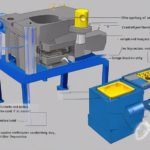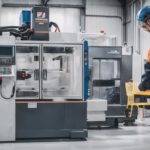Opt for advanced mold cooling technologies like Conformal Cooling and CO2 Gas Cooling for enhanced production efficiency and part quality. Reduce cycle times and prevent warping deformation with these innovative solutions. Pulse Cooling and CO2 Gas Cooling technologies offer rapid cooling capabilities, expediting mold cooling processes by up to 30%. Uniform cooling throughout the mold guarantees precision and surface finish, minimizing defects and residual stresses. These cutting-edge technologies guarantee consistent part dimensions and superior product quality. Explore how these advanced cooling methods can revolutionize injection molding processes.
Importance of Advanced Cooling Technologies
The significance of embracing advanced cooling technologies in mold manufacturing can't be overstated. By implementing advanced cooling technologies such as Conformal Cooling, manufacturers in the plastic injection industry can achieve improved part quality, reduced cycle times, and enhanced production efficiency. These technologies, designed to guarantee uniform cooling throughout the mold, play a vital role in optimizing cooling efficiency and preventing issues like warping deformation.
Conformal Cooling technology, developed in conjunction with rapid prototyping methods, offers a substantial increase in molding efficiency of over 30%. This innovation maintains a consistent distance from the cavity surface, promoting uniform cooling and resulting in superior product quality and performance. Advanced cooling technologies not only enhance the quality of molded parts but also lead to faster production rates and extended tooling lifespan, providing significant benefits to manufacturers looking to streamline their operations and stay competitive in the industry.
Faster Mold Cooling for Efficiency

You can achieve enhanced cooling systems and improved production rates by implementing advanced mold cooling technologies like Pulse Cooling and CO2 Gas Cooling.
These technologies offer rapid cooling capabilities, enabling faster cycle times and increased efficiency in the manufacturing process.
Enhanced Cooling Systems
Utilizing advanced cooling systems such as Pulse Cooling and CO2 Gas Cooling can greatly expedite mold cooling processes by up to 30% compared to traditional methods. These technologies focus on optimizing the design of mold cooling channels to enhance heat transfer efficiency during the injection molding process. By effectively controlling the temperature of the mold, these systems contribute to reducing cycle times and improving overall production rates.
Companies like CITO in the US lead the way in developing equipment that maximizes the effectiveness of these advanced cooling technologies. CO2 Gas Cooling, specifically, excels in maintaining the structural integrity of plastic parts by preventing warping during the cooling phase. Incorporating these enhanced cooling systems into mold designs ensures a more precise and consistent cooling process, resulting in higher efficiency and quality output.
Improved Production Rates
Implementing cutting-edge mold cooling technologies can greatly enhance production rates by accelerating the cooling process for increased efficiency.
Advanced cooling technologies such as Conformal Cooling have revolutionized the manufacturing industry by improving part quality and decreasing the injection molding cycle times. By optimizing heat transfer within the mold, Conformal Cooling technology guarantees uniform cooling, reducing warpage and cycle times, ultimately leading to higher production rates.
This innovation, along with Pulse Cooling and CO2 Gas Cooling technologies, offers significant efficiency gains in the cooling process, resulting in faster mold cooling and enhanced overall production efficiency.
The integration of these advanced manufacturing techniques is essential for companies looking to stay competitive in the rapidly evolving manufacturing landscape.
Enhanced Product Quality With Advanced Cooling

Enhance your product quality with advanced cooling technologies that guarantee improved mold performance and faster production cycles.
Achieve higher precision and better surface finish through uniform cooling across intricate mold geometries.
Reduce defects, warpage, shrinkage, and residual stresses in molded parts by maintaining ideal mold temperatures with these cutting-edge cooling systems.
Improved Mold Performance
Incorporating advanced mold cooling technologies results in superior product quality through optimized cooling processes, leading to enhanced mold performance.
By utilizing conformal cooling designs, uniform cooling is achieved, reducing part warpage and defects. These technologies not only improve quality but also decrease cycle times, enhancing production efficiency.
The precise control of mold temperatures provided by advanced cooling systems guarantees consistent part dimensions and superior surface finishes. Hot spots within molds are prevented, resulting in higher quality parts and lower scrap rates.
Faster Production Cycles
By optimizing cooling processes through advanced technologies, you can greatly reduce cycle times and achieve faster production cycles while enhancing product quality with superior cooling efficiency.
Here's how it works:
- Conformal cooling technology decreases cycle times by up to 30%, boosting efficiency.
- Enhanced cooling efficiency leads to improved product quality with fewer defects.
- Maintaining uniform temperatures in molds guarantees consistent part dimensions and surface finish.
- Reduced cooling times result in increased production output, enhancing overall process control and enabling reliable manufacturing operations.
Reduced Cycle Times Using Advanced Technologies

Implementing advanced mold cooling technologies can greatly reduce cycle times in injection molding processes by utilizing innovative methods such as Pulse Cooling, CO2 Gas Cooling, and Conformal Cooling.
Pulse Cooling has been shown to decrease cycle times by 10% to 30% compared to conventional cooling methods.
CO2 Gas Cooling technology enhances cooling efficiency substantially, leading to faster cycles in injection molding processes.
Conformal Cooling, pioneered by Professor Sachs of MIT, can boost molding efficiency by over 30%, resulting in reduced cycle times.
By incorporating these advanced cooling technologies into mold designs, heat dissipation is improved, and uniform cooling is achieved, consequently optimizing production efficiency.
The substantial reductions in cycle times achieved through the implementation of these advanced mold cooling technologies underscore their importance in enhancing overall production efficiency and competitiveness in the injection molding industry.
Cost Savings Through Advanced Cooling Methods

Advanced cooling methods offer substantial cost savings through improved energy efficiency and enhanced production processes. When considering the cost benefits of advanced cooling technologies, the following points become evident:
- Implementation of CO2 gas cooling technology can reduce mold cycle times by 15-20%, leading to increased production output and decreased operational costs.
- Conformal cooling channels can optimize the cooling process, resulting in over 30% increase in molding efficiency, ultimately saving on energy consumption and production time.
- Pulse cooling technology provides 10-30% higher efficiency in cooling molds, contributing to cost reduction by improving cycle times and overall productivity.
- Utilizing advanced cooling methods can prevent warping deformation in plastic parts, reducing scrap rates and production costs significantly.
Environmental Benefits of Advanced Cooling

Enhancing mold cooling technologies presents substantial environmental advantages in reducing energy consumption and promoting sustainable manufacturing practices. By implementing advanced cooling technologies such as CO2 gas cooling, energy consumption can be cut by up to 50% compared to traditional methods.
The adoption of conformal cooling systems not only decreases coolant usage but also contributes to environmental sustainability. Pulse cooling technology further enhances environmental benefits by lowering greenhouse gas emissions associated with mold cooling processes through improved efficiency.
Additionally, the use of innovative cooling solutions in injection molding plays an important role in minimizing environmental impact by improving energy efficiency and promoting resource conservation. These advancements in mold cooling not only lead to reduced water consumption but also align with eco-friendly practices in manufacturing, supporting the overall goal of environmental sustainability.
Embracing these innovative approaches to cooling can significantly contribute to a more sustainable and efficient manufacturing industry.
Uniform Cooling for Fewer Defects

Optimizing mold cooling techniques such as conformal cooling channels guarantees uniform temperature distribution throughout the mold surface, minimizing defects in molded parts. Here's why uniform cooling is important for achieving high-quality molded products:
- Defect Reduction: Uniform cooling provided by conformal cooling channels helps in reducing common defects like sink marks and shrinkage, resulting in improved part quality.
- Prevention of Hot Spots: By maintaining consistent temperatures across the mold surface, uniform cooling prevents the formation of hot spots that can lead to defects and inconsistencies in the final product.
- Enhanced Precision: Uniform cooling ensures that the entire mold cools at the same rate, promoting higher precision in the dimensions of the molded parts.
- Better Surface Finish: With uniform cooling, the risk of uneven cooling, which can affect the surface finish of the molded parts, is greatly minimized.
Improved Dimensional Stability With Advanced Cooling

Utilizing cutting-edge cooling technologies such as conformal cooling channels enhances the dimensional stability of molded parts. Advanced cooling methods play a significant role in minimizing warping and ensuring consistent dimensions in injection molded products.
By promoting uniform cooling throughout intricate geometries, these techniques effectively reduce part distortion and enhance dimensional stability. The increased cooling efficiency provided by these technologies helps alleviate residual stresses within the molded components, leading to improved accuracy in part dimensions.
As a result, the use of advanced cooling solutions not only contributes to higher quality molded parts but also enhances the overall precision of the manufacturing process. By mitigating dimensional variations and maintaining uniform cooling, advanced cooling technologies effectively address the challenges associated with achieving dimensional stability in molded products, ultimately optimizing the production of components with reliable and consistent dimensions.
Frequently Asked Questions
What Is the Significance of Mold Cooling?
Mold cooling plays an important role in plastic injection molding by regulating temperatures for ideal solidification. It's essential for achieving consistent part quality, reducing cycle times, and minimizing defects such as warping and sink marks.
Efficient cooling technologies, like conformal cooling systems, can boost production efficiency by more than 30%. Advanced cooling techniques are necessary for preventing overheating, maintaining dimensional stability, and improving the overall quality of molded parts.
When Cooling a Mold, Which Method of Cooling Is Best?
When cooling a mold, the optimal method is one that guarantees uniform cooling to enhance efficiency and quality. Technologies like conformal cooling, CO2 gas cooling, and pulse cooling offer enhanced cooling efficiency compared to traditional methods.
By closely following the mold cavity shape, conformal cooling maintains distance for uniform cooling, while CO2 gas and pulse cooling technologies provide innovative ways to optimize cooling processes.
These advanced techniques offer significant benefits in molding operations.
Why Is Mold Cooling Necessary for Long and Deep Core Designs?
To achieve uniform solidification and prevent defects in long and deep core designs, efficient mold cooling is essential. Inadequate cooling can lead to warping, shrinkage, or part deformation. Consistent temperatures throughout the mold are necessary for complex designs.
Advanced cooling technologies help maintain ideal conditions for intricate molds, enhancing production efficiency and part quality. Proper cooling techniques are important for ensuring successful outcomes in these challenging mold configurations.
Why Is the Temperature of Mold Important?
Maintaining precise mold temperature is essential for consistent part quality. It impacts part dimensions, cycle time, and production efficiency in injection molding.
Proper temperature control minimizes defects like warping and sink marks. It also enhances material flow and fill, improving overall part quality. Control over mold temperature prevents thermal stresses, ensuring uniform cooling.
Effective mold temperature regulation is key for high productivity and cost-effectiveness in plastic injection molding.
Conclusion
You may think sticking with traditional mold cooling methods is the safe choice, but in reality, opting for advanced cooling technologies is the smarter move. By embracing innovation, you can achieve faster cooling, higher product quality, reduced cycle times, cost savings, environmental benefits, fewer defects, and improved dimensional stability.
Don't let outdated practices hold you back – choose advanced cooling technologies for a brighter future in mold manufacturing.







